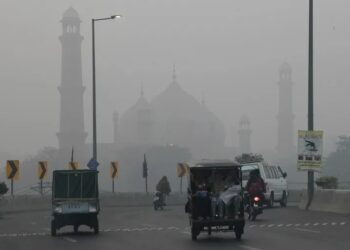Written by : Abdul Basit Alvi
The presence of refugees in host countries creates significant challenges for both the refugees and local populations. While many host nations generously offer refuge, the influx of refugees can lead to social, economic, and political challenges, especially when the number of refugees exceeds available resources and infrastructure. One of the most pressing challenges faced by host countries is the economic burden of accommodating large numbers of refugees. Providing basic services like food, healthcare, housing, and education for refugees can be overwhelming, particularly for countries with limited economic resources. Jordan and Lebanon have hosted large numbers of Syrian refugees since the onset of the Syrian Civil War. Both countries, not among the wealthiest in the Middle East and with relatively small populations, have seen their economies severely strained by the influx. In Lebanon, the refugee population, which now constitutes around 25% of the total population, has overwhelmed public services, contributing to unemployment and inflation. Lebanon’s already struggling economy, compounded by political instability and economic mismanagement, has been further impacted by this additional burden. Turkey, which has been hosting over 3.6 million Syrian refugees, also faces considerable challenges in managing the large refugee population. Despite substantial international aid, Turkey struggles to provide sufficient healthcare, education, and social services to its refugee population. The economic strain has led to rising inflation, unemployment, and a depletion of public resources in certain regions. The expenses associated with housing refugees, offering social welfare, and creating employment opportunities can result in budget deficits or force the government to divert funds from other critical areas, such as infrastructure and development. Refugees often enter the labor markets of host countries where job opportunities are already scarce. In many cases, they accept lower-paying positions or are forced to work in the informal economy, which can create competition with local workers. This can lead to tensions between refugees and the local population, especially in areas with high unemployment or economic instability. Several EU countries, including Greece, Italy, and Germany, have experienced such tensions over job opportunities. For instance, in Germany, although the refugee crisis has been relatively well-managed through government programs and private sector integration efforts, there have been instances where refugees were perceived as competing for jobs, particularly in areas with high unemployment. This perception has contributed to rising anti-immigrant sentiments and social unrest in some regions.
Kenya has hosted refugees from neighboring Somalia for decades, with many living in the Dadaab and Kakuma refugee camps. While refugees often find work in informal sectors, their presence has intensified competition for jobs, especially in the capital, Nairobi. In regions already struggling with poverty, refugees can be seen as direct competitors for limited employment opportunities, which can create tensions between refugees and local residents. As refugee populations increase, they place growing demands on public services such as healthcare, education, housing, and sanitation. Host countries, particularly those with limited resources, may find it challenging to meet these needs, resulting in overcrowded facilities and lower-quality services that affect both refugees and locals.
Uganda is one of the largest hosts of refugees in Africa, particularly those fleeing conflict in South Sudan and the Democratic Republic of Congo. The country has adopted a progressive refugee policy, offering refugees land for farming and the right to work. However, the rapid influx of refugees has strained the healthcare system, leading to overcrowded hospitals and shortages of medical supplies. Education systems have also been overwhelmed, and refugees often attend poorly resourced schools, which impacts the quality of education for both refugees and local children.
Lebanon’s public services have been severely strained due to the influx of Syrian refugees. The healthcare system, already fragile before the refugee crisis, has been overwhelmed by increased demand for medical care. Hospitals and clinics, particularly in areas with large concentrations of refugees, are often overcrowded, leading to long wait times and limited access to quality care. Similarly, Lebanon’s education system, which already faced overcrowded classrooms, has had to accommodate many refugee children, further stretching its capacity.
Bangladesh has been grappling with the influx of Rohingya refugees from Myanmar since 2017. The Cox’s Bazar refugee camps, which house over 1 million refugees, have placed immense pressure on the country’s healthcare, education, and sanitation systems. The overcrowded conditions in these camps make it difficult to ensure access to clean water and proper hygiene, increasing the risk of disease outbreaks.
The large number of refugees can also exacerbate existing social tensions in host countries. Host populations may perceive refugees as a threat to their culture, values, and way of life, leading to xenophobia, discrimination, and social unrest. Additionally, the increased competition for limited resources can fuel resentment. The Syrian refugee crisis, for example, sparked significant public debate in Germany, where many Germans welcomed refugees, while others expressed concerns about cultural integration, security, and the economic impact. In certain regions, particularly in smaller towns, there have been reports of growing anti-refugee sentiments, leading to protests and clashes between far-right groups and those supporting refugee rights. In Turkey, the prolonged presence of millions of Syrian refugees has created tensions between refugees and local communities, particularly in urban areas. Many Turkish citizens have expressed frustration over the perceived pressure on public services and the job market. Nationalist political parties have capitalized on these tensions, using anti-refugee rhetoric to gain support. Italy, a major entry point for migrants crossing the Mediterranean, has faced tensions between locals and refugees, particularly in regions like Sicily and Lampedusa, which have experienced the highest influx of refugees. The arrival of refugees has sparked protests and debates over immigration policies, leading to a rise in xenophobic attitudes in certain areas. Host countries often express concerns that refugees could contribute to security issues, such as criminal activity or the rise of extremist groups. These concerns can be intensified by cultural differences, social isolation, and the challenges associated with integrating refugees into society. Following the refugee crisis, some European countries raised concerns about refugee integration, especially after a series of terrorist attacks in European cities. While there is little evidence linking refugees to an increased risk of terrorism, the political discourse surrounding the crisis has fueled national security fears, leading to heightened surveillance, stricter border controls, and a rise in anti-immigrant sentiment.
In Kenya, some refugees living in camps, especially in Dadaab and Kakuma, have been accused of being vulnerable to recruitment by extremist groups like Al-Shabaab, which operates in Somalia. The presence of such groups in refugee camps has raised concerns about potential violence or radicalization. Large refugee populations often create environmental challenges in host countries. Refugees living in camps can contribute to deforestation, pollution, and depletion of natural resources, worsening local environmental degradation. In Uganda, refugee settlements in rural areas have led to deforestation as refugees rely on firewood for cooking and heating, putting pressure on local ecosystems, causing soil erosion, and impacting local farming communities. Ethiopia has faced similar environmental issues related to hosting refugees, especially from South Sudan and Somalia. Refugee camps in areas like Jijiga and Dollo Ado have experienced rapid deforestation due to the demand for firewood, further damaging the local environment.
Refugees in host countries have both rights and responsibilities to ensure their successful integration and respect for the laws and norms of the host nation. They are expected to abide by the laws and regulations of the host country, adhere to social norms, respect the rights of others, and avoid actions that could disrupt public order. Refugees are encouraged to engage in the host country’s community life, including participating in work, education, and volunteer activities, contributing to the local economy, and promoting social cohesion. While refugees bring their own cultural heritage, they are encouraged to understand and respect the cultural values of their host country, including learning the local language, participating in community events, and understanding societal norms. Refugees must also cooperate with the host country’s immigration and asylum processes, ensuring they meet the legal requirements for residency, work, or citizenship. Additionally, refugees should use public resources such as healthcare, education, and housing responsibly, avoiding unnecessary exploitation of services. By fulfilling these responsibilities, refugees not only pave the way for their own successful integration but also contribute to the well-being and stability of the host community.
In the context of Afghanistan, the ongoing situation has resulted in a large number of Afghan refugees fleeing their homeland in search of safety and stability in various countries around the world. Over the years, political instability, armed conflicts, and the recent resurgence of the Taliban in 2021 have forced millions of Afghans to flee their homeland, resulting in one of the largest refugee crises of the 21st century. In response, numerous countries have offered asylum and assistance to Afghan refugees, with varying levels of support, challenges, and outcomes. Afghanistan has been mired in conflict for more than four decades, with major displacement events occurring during the Soviet invasion (1979-1989), the subsequent civil war, the rise of the Taliban in the 1990s, and the U.S.-led invasion in 2001. Each of these conflicts led to large waves of people fleeing Afghanistan. The 2021 U.S. withdrawal and the Taliban’s return to power triggered another massive exodus, with estimates suggesting over 5.5 million Afghans were displaced, many seeking refuge in neighboring countries and beyond. Today, the majority of Afghan refugees are hosted in Pakistan, Iran, and other regional countries, while a smaller portion has resettled in Western nations such as the United States, Canada, and countries within the European Union.
Pakistan and Iran have borne the heaviest burden of hosting Afghan refugees. Both countries have been home to millions of Afghan refugees over the decades, especially during periods of intensified conflict in Afghanistan. At its peak, Pakistan hosted over 3 million Afghan refugees. Currently, approximately 1.5 million registered Afghan refugees remain in Pakistan, with many others living there without official recognition. The majority reside in the provinces of Khyber Pakhtunkhwa and Balochistan, near the Afghanistan-Pakistan border. While Pakistan has provided refuge, the country faces significant challenges due to economic constraints, strained resources, and security concerns related to cross-border terrorism. Afghan refugees in Pakistan often struggle with limited access to employment, education, and healthcare, but the country has made efforts to extend some legal protections, including stay permits for Afghan refugees in specific regions.
Iran, with a long history of hosting Afghan refugees, currently accommodates around 1 million Afghan refugees, many of whom arrived during the 1980s and 1990s. Iran has provided refugees with education, healthcare, and some employment opportunities, though they often endure difficult living conditions and lack rights compared to Iranian citizens. Many Afghan refugees work in Iran’s labor market, especially in construction and agriculture, often in low-wage and hazardous jobs.
The United States has been a significant destination for Afghan refugees, especially after the chaotic U.S. withdrawal in 2021. Over 100,000 Afghan refugees were evacuated under Operation Allies Refuge (OAR), which aimed to safely relocate those who had assisted the U.S. military and their families. The U.S. government has provided temporary housing in military bases and resettlement services to help Afghan refugees integrate into American society. However, the resettlement process has faced criticism for being slow and cumbersome, with many refugees still grappling with uncertain legal status and challenges in securing housing and employment.
Canada has been one of the most proactive countries in resettling Afghan refugees. The Canadian government announced plans to welcome up to 40,000 Afghan refugees following the Taliban’s return to power. Canada’s resettlement programs focus on providing refugees with permanent residency, healthcare, education, and language support to ease their integration into Canadian society. Thanks to Canada’s strong tradition of welcoming refugees and its relatively robust support systems, many Afghan refugees have successfully integrated into communities across the country. However, challenges such as housing shortages and adapting to the Canadian job market persist. The European Union, along with individual European countries like Germany, the UK, and France, has also been instrumental in resettling Afghan refugees. Germany, in particular, has been a key destination for many Afghans, with tens of thousands arriving following the Taliban’s takeover. The European Union has encountered significant political and social challenges in relation to refugee resettlement, particularly concerning security and the integration of refugees into European societies. Despite these challenges, countries like Germany have established asylum pathways and integration programs that offer language courses, employment assistance, and cultural orientation for Afghan refugees. Although Afghan refugees have found safety in various countries, they face several common challenges. In many host countries, refugees struggle to secure legal status, which limits their access to essential services such as healthcare, education, and job opportunities. The lack of legal protection often leaves them vulnerable to exploitation and abuse. Finding stable employment and affordable housing remains a major obstacle for Afghan refugees, especially in countries with high unemployment or strained housing markets. Cultural integration can also be difficult, as refugees often face discrimination and social isolation due to differences in language, religion, and customs. Many Afghan refugees have experienced significant trauma due to years of conflict, displacement, and violence, making it crucial to address their psychological and emotional needs for successful integration into host societies. The large influx of Afghan refugees has sparked political debates and public concerns in many countries, with some resisting refugee acceptance due to fears over security, economic pressures, and cultural differences.
In Pakistan, one of the most pressing concerns is the security implications posed by the large Afghan refugee population. Many refugees reside in border regions like Khyber Pakhtunkhwa (KP) and Balochistan, areas that are near Afghanistan and regularly experience cross-border tensions. The porous Pakistan-Afghanistan border has made it difficult to distinguish between Afghan refugees, migrants, and militants. The Tehrik-i-Taliban Pakistan (TTP), a militant group that has been waging an insurgency against the Pakistani state for over a decade, represents one of the most significant security threats in the region. The TTP operates primarily along the Pakistan-Afghanistan border and has exploited the situation of Afghan refugees for recruitment, logistics, and operational support. Following the Taliban’s return to power in 2021, there has been a significant increase in TTP activity. The group has used the relatively ungoverned spaces along the border to launch attacks into Pakistan, destabilizing already fragile regions populated by refugees. Other insurgent groups, including the Haqqani Network, have also found sanctuary in Afghan refugee camps and border areas in Pakistan. The vast, often inaccessible terrain along the border allows militants to operate covertly, resulting in rising cross-border incursions, terrorist attacks, and bombings in Pakistani cities. The TTP has frequently targeted Pakistan’s military, security forces, and civilian infrastructure, sometimes using Afghan refugee camps as cover to operate in regions like Khyber Pakhtunkhwa and Balochistan, worsening insecurity in these areas. Additionally, militant groups have been known to infiltrate refugee camps, where they sometimes radicalize vulnerable refugees, further complicating the challenges faced by Pakistani authorities in managing the large refugee population in the region. The TTP has openly allied itself with the Taliban, and although the Taliban government has occasionally stated that it discourages cross-border violence, Pakistani officials view the Taliban’s tolerance of TTP fighters operating from Afghan territory as a significant threat. In some instances, TTP leaders and fighters have sought refuge in Afghanistan, using the country as a base to launch attacks into Pakistan. The absence of a strong central government in Afghanistan following the Taliban’s takeover has allowed these militant groups to operate with greater freedom. In addition to the security threats posed by Afghan refugees and militant groups, Pakistan faces significant humanitarian and socioeconomic challenges due to the presence of such a large displaced population. Already grappling with its own economic difficulties, Pakistan has been forced to allocate substantial resources to provide basic services to Afghan refugees, including food, shelter, healthcare, and education. With over 1.5 million registered refugees (and many more unregistered), the strain on Pakistan’s public services is immense. The influx of refugees has placed considerable pressure on Pakistan’s fragile healthcare system, where refugees often lack access to adequate medical care, leading to poor health outcomes and the spread of diseases in both refugee camps and host communities.
The educational infrastructure is similarly overwhelmed by the large refugee population. Refugee children face significant barriers to accessing quality education, including a lack of resources in refugee camps and cultural and language differences between refugees and local communities. Many Afghan refugees live in poverty and often end up in low-paying, informal jobs. While refugees contribute to the economy by working in sectors such as agriculture, construction, and manufacturing, the lack of formal recognition and work permits often leads to exploitation and underemployment, further exacerbating the economic strain in already impoverished areas like Balochistan and Khyber Pakhtunkhwa.
As Pakistan’s unemployment rate rises, the large refugee population has increased competition for jobs, contributing to social tension between Afghan refugees and local communities. This has fueled resentment, as some Pakistanis perceive refugees as taking scarce job opportunities. Additionally, the influx of Afghan refugees has led to social and cultural tensions, particularly in border regions where local populations feel the pressure of housing, feeding, and providing for refugees. Cultural differences between Afghan refugees and local communities, especially in areas where tribal divisions and ethnic rivalries exist, have occasionally led to xenophobia, discrimination, and ethnic tension. Many Afghan refugees belong to ethnic groups such as Pashtuns, Tajiks, and Hazaras, which further complicates their integration with local Pakistani populations.
Pakistan has hosted Afghan refugees for over four decades, making it one of the countries most generous in supporting Afghan displaced persons. However, in recent years, there has been growing concern over some Afghan refugees becoming involved in illegal activities. In Karachi alone, over 400,000 Afghan nationals are residing illegally, with 225 Afghan nationals arrested for various crimes, including incidents that led to fatalities. This has caused widespread anxiety and placed an undue burden on Pakistan’s resources.
Furthermore, the presence of Afghan refugees has coincided with an alarming rise in terrorist incidents in Pakistan. The recent activities of the Tehreek-e-Taliban Pakistan (TTP) have led to over 2,500 deaths in 2024, the highest toll in the past nine years. These terrorist attacks have disrupted foreign investment in Pakistan and created uncertainty around the country’s infrastructure projects. In response to these challenges, Pakistan’s Interior Ministry has ordered all illegal foreign nationals and Afghan citizen cardholders to leave the country by March 31, 2025, with deportations set to begin on April 1, 2025. This decision has been made in response to national security concerns and economic pressures. In fact, relatively few Afghan refugees have been accepted by other countries. Germany has so far taken in 180,000 Afghan refugees, while Turkey hosts around 130,000 Afghan refugees. These figures clearly demonstrate that Pakistan is shouldering a much heavier burden than many other countries, while the pace at which other nations are accepting Afghan refugees has been slow. Pakistan has hosted Afghan refugees for the past 40 years, but given the current circumstances, this burden has become unsustainable. The repatriation of Afghan refugees has now become unavoidable due to Pakistan’s national security, economic concerns, and long-term interests. The international community must take action to initiate rehabilitation projects in Afghanistan so that returning refugees can live with dignity and contribute to rebuilding their country. No nation can continue to host refugees at the expense of its own citizens. A recent example comes from the United States, where President Donald Trump proposed strict measures against illegal immigrants and foreign nationals. This action underscores that even the world’s wealthiest country cannot afford to support refugees indefinitely. If the United States, with all its resources, cannot manage the cost of hosting refugees, it raises the question of how a country like Pakistan, grappling with severe economic and security challenges, can continue to do so. While Afghans are our brothers in faith, Pakistan can no longer bear the responsibility of hosting them.
The nation wholeheartedly supports the government’s decision to repatriate Afghan refugees and urges that the process be expedited. The global community should also support Pakistan in its efforts for stability, as a secure and stable Pakistan benefits the entire world.

























